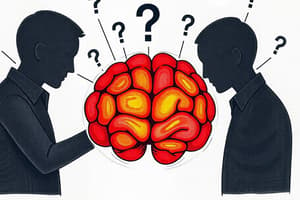Podcast
Questions and Answers
Which factor is linked to improved cognitive function throughout life stages?
Which factor is linked to improved cognitive function throughout life stages?
- Dietary changes
- Mental exercises
- Physical exercise (correct)
- Sleep quality
What aspect of language learning in animals is most controversial?
What aspect of language learning in animals is most controversial?
- Learning syntax (correct)
- Capacity to use non-verbal communication
- Ability to understand abstract concepts
- Communicating with humans
Which technique may not improve fluid intelligence despite enhancing working memory capacity?
Which technique may not improve fluid intelligence despite enhancing working memory capacity?
- Mindfulness practices
- Physical fitness activities
- Cognitive training programs
- Mental exercises (correct)
What type of language can animals develop, according to the studies mentioned?
What type of language can animals develop, according to the studies mentioned?
How can working memory be improved effectively?
How can working memory be improved effectively?
What are natural concepts primarily formed from?
What are natural concepts primarily formed from?
Which term refers to mental representations that can resemble objects or events?
Which term refers to mental representations that can resemble objects or events?
What term describes the smallest units of meaning in a language?
What term describes the smallest units of meaning in a language?
Which type of concept is defined by specific rules or features?
Which type of concept is defined by specific rules or features?
How can culture influence the definition of intelligence?
How can culture influence the definition of intelligence?
Which concept asserts that language influences thought processes?
Which concept asserts that language influences thought processes?
What is the primary purpose of a culture-fair intelligence test?
What is the primary purpose of a culture-fair intelligence test?
What aspect of language refers to the rules for combining words into sentences?
What aspect of language refers to the rules for combining words into sentences?
What role do cognitive factors play in language acquisition?
What role do cognitive factors play in language acquisition?
Which of the following is associated with the idea that concepts precede language?
Which of the following is associated with the idea that concepts precede language?
Which of the following is a characteristic of mental images?
Which of the following is a characteristic of mental images?
Which term describes the rules governing the structure and usage of a language?
Which term describes the rules governing the structure and usage of a language?
Which of the following best describes the role of pragmatics in language?
Which of the following best describes the role of pragmatics in language?
What is a significant outcome related to cognitive processes in thinking?
What is a significant outcome related to cognitive processes in thinking?
What is the premise of Vygotsky's theory regarding language and thought?
What is the premise of Vygotsky's theory regarding language and thought?
In the context of language elements, which of the following refers to the basic units of sound?
In the context of language elements, which of the following refers to the basic units of sound?
Flashcards
Animal Language Skills
Animal Language Skills
Some animals can learn a basic form of language, including abstract ideas but can't learn syntax.
Animal Syntax
Animal Syntax
Animals lack the ability to learn grammatical rules or syntax, that are essential for complex language.
Working Memory Training
Working Memory Training
Training can improve working memory capacity but may not improve fluid intelligence.
Fluid Intelligence
Fluid Intelligence
Signup and view all the flashcards
Physical Exercise & Cognition
Physical Exercise & Cognition
Signup and view all the flashcards
Language
Language
Signup and view all the flashcards
Grammar
Grammar
Signup and view all the flashcards
Phonemes
Phonemes
Signup and view all the flashcards
Morphemes
Morphemes
Signup and view all the flashcards
Syntax
Syntax
Signup and view all the flashcards
Semantics
Semantics
Signup and view all the flashcards
Pragmatics
Pragmatics
Signup and view all the flashcards
Linguistic Relativity Hypothesis
Linguistic Relativity Hypothesis
Signup and view all the flashcards
Thinking (cognition)
Thinking (cognition)
Signup and view all the flashcards
Mental images
Mental images
Signup and view all the flashcards
Concepts
Concepts
Signup and view all the flashcards
Formal concepts
Formal concepts
Signup and view all the flashcards
Natural concepts
Natural concepts
Signup and view all the flashcards
Culture's Influence on Intelligence
Culture's Influence on Intelligence
Signup and view all the flashcards
Culture-Fair Tests
Culture-Fair Tests
Signup and view all the flashcards
Intelligence Labels
Intelligence Labels
Signup and view all the flashcards
Study Notes
Chapter 7: Cognition
- Cognition is mental activity involved in processing information, organizing, understanding, and communicating to others.
- Mental images are mental representations depicting objects or events.
- Concepts are ideas representing categories of objects, events, or activities.
- Formal concepts are defined by rules or features.
- Natural concepts are formed from real-world experiences (e.g., platypus).
- Prototypes closely match defining characteristics.
- Schemas are mental generalizations about objects, places, events, and people.
- Scripts are schemas for familiar sequences.
- Problem solving occurs when a goal is achieved through thought and behavior.
- Decision making involves identifying, evaluating, and choosing between alternatives.
- Trial and error involves trying solutions until success.
- Algorithms are specific, step-by-step procedures guaranteed to work (e.g., mathematical formulas).
- Heuristics are educated guesses based on prior experiences to narrow down possible solutions.
- Representative heuristic assumes shared characteristics indicate membership in a category.
- Availability heuristic estimates frequency based on ease of recalling information.
- Working backward from a goal is a useful heuristic.
- Insight is sudden perception of a solution (e.g., Köhler's work with Sultan).
- Problem-solving barriers include:
- Functional fixedness: thinking about objects only in terms of typical functions.
- Mental set: persisting in using past successful problem-solving patterns.
- Confirmation bias is the tendency to seek evidence supporting one's beliefs while ignoring contradictory evidence.
- Creativity involves combining ideas in new ways.
- Convergent thinking leads to one correct answer.
- Divergent thinking generates multiple ideas.
- Techniques for stimulating divergent thinking include brainstorming, keeping a journal, freewriting, and mind/subject mapping.
Intelligence
-
Intelligence is the ability to learn from experiences, acquire knowledge, and effectively adapt to new situations or solve problems.
-
Theories of intelligence include:
- Spearman's theory:
- g factor (general intelligence): ability to reason and solve problems.
- s factors (specific intelligence): ability to excel in certain areas.
- Gardner's theory of multiple intelligences (nine types).
- Sternberg's triarchic theory of intelligence (analytical, creative, and practical intelligences).
- Spearman's theory:
-
Intelligence quotients (IQs) are measures of intelligence, calculated by dividing mental age by chronological age, then multiplying by 100.
- IQ tests like Stanford-Binet and Wechsler yield both verbal and performance scores, as well as an overall score.
-
IQ test development involves standardization, resulting in norms that follow a normal curve.
-
Deviation IQ scores measure intelligence based on a normal distribution with a mean of 100 and standard deviation of about 15.
-
Crystallized intelligence refers to accumulated knowledge over time, and remains steady with age.
-
Fluid intelligence is the ability to solve problems, reason abstractly, and learn new skills, and declines with age.
-
IQ tests can be culturally biased, reflecting the cultural backgrounds of the designers.
- Culture-fair tests use nonverbal tasks to ensure they are less culturally biased.
-
IQ tests are useful for predicting academic success and job performance. They are also helpful in identifying developmental disorders like head injuries and neuropsychological disorders.
Intellectual Disability
- Intellectual disability (intellectual developmental disorder) is a diagnosis when mental ability and adaptive behavior are deficient.
- Diagnostic criteria include IQ below 70 and deficient adaptive behavior. This condition was previously known as mental retardation or developmental delay.
- Levels of severity are determined by adaptive functioning and required support, rather than IQ.
- Causes of intellectual delay may include deprived environments, genetic/chromosome disorders, and environmental toxins, like alcohol or a lack of nutrition.
Giftedness
- Gifted individuals constitute approximately 2% of the population and typically have an IQ of 130 or above.
- Stereotypes about gifted individuals include oddness, social awkwardness, physical weakness or a higher risk of mental illness.
- Terman conducted a study to show success in gifted children. However, his objectivity was criticized due to his high level of interaction in the subjects' lives.
- Individuals exhibit high levels of emotional intelligence; recognizing, processing and managing their own emotions, as well as those of others, and motivating oneself.
Heredity, Environment, and Intelligence
- Stronger genetic correlations are observed as genetic relatedness increases. Heritability of IQ is approximately 50%.
- Flynn effect: IQ scores have increased over time in modernized countries.
- The Bell Curve: book arguing that intelligence is largely hereditary. This theory has been widely criticized.
- Environmental factors, like the stereotype threat, also influence IQ results.
Language
- Language is a system of symbols used to combine to create an infinite number of meaningful statements for communication.
- Elements of language structure include:
- Grammar: rules governing the structure and use of language.
- Phonemes: basic units of sound.
- Morphemes: smallest units of meaning.
- Syntax: the rules for combining words and phrases into sentences.
- Semantics: rules for determining meaning of words and sentences.
- Pragmatics: the practical aspects and social skills involved in communication.
Language and Cognition
- Language influences cognition. Different perspectives include:
- Piaget argues concepts precede language.
- Vygotsky proposes language helps develop concepts.
- The linguistic relativity hypothesis (Sapir-Whorf) suggests that thought processes are controlled by language.
- Cognitive universalism proposes that concepts are universal and influence language development.
Animal Studies in Language
- Some animal studies demonstrate animal ability to comprehend basic language.
- Controversy surrounds animal abilities to learn syntax (the combination of words to create meaning) and whether or not this truly demonstrates language acquisition.
Ways to Improve Thinking
- Mental exercise improves working memory. Aerobic exercise improves cognitive function.
Studying That Suits You
Use AI to generate personalized quizzes and flashcards to suit your learning preferences.




